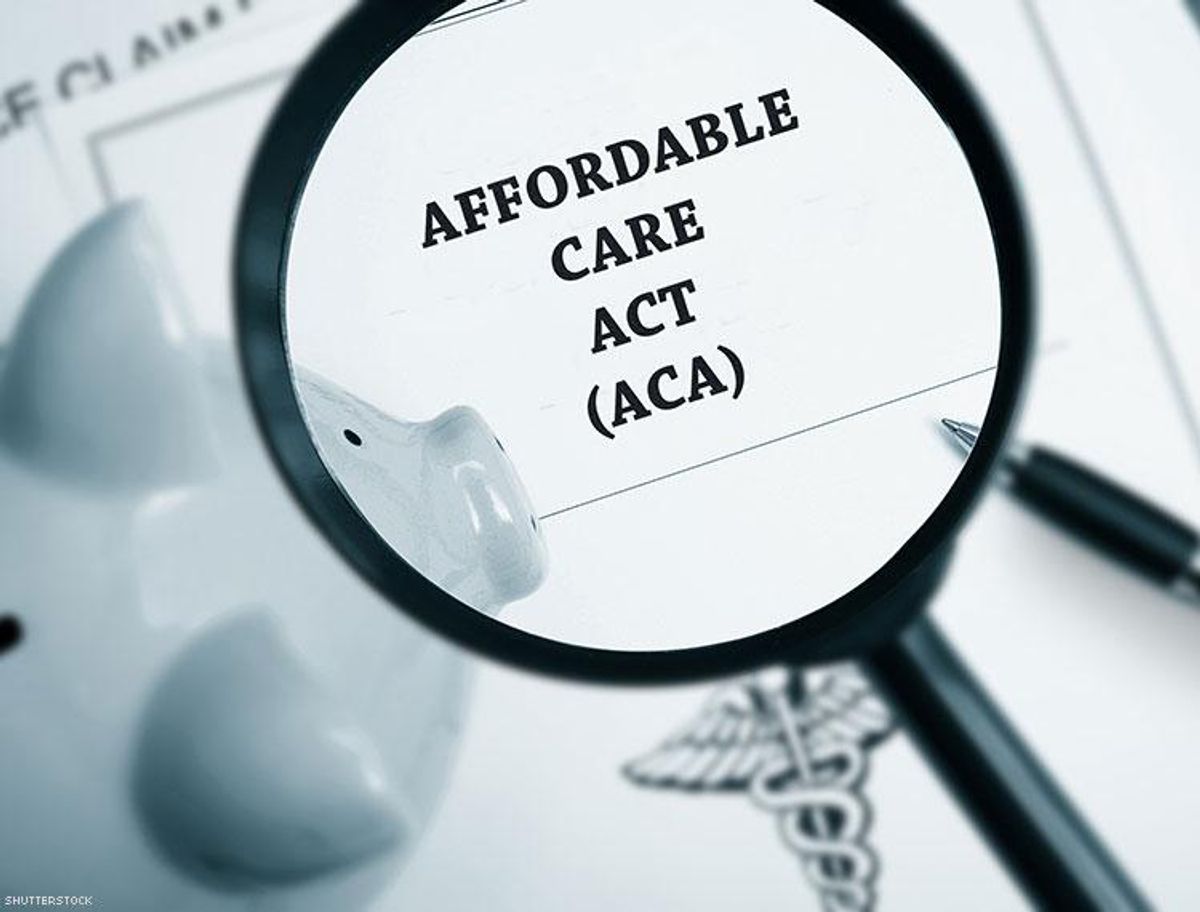People living with HIV (PLWH) have benefited disproportionately from increased access to health insurance coverage under the Affordable Care Act (ACA). In 2013, before key provisions to expand access to health insurance were implemented, just 17 percent of the estimated 1.2 million Americans living with HIV had private health insurance. PLWH were often unable to access health insurance because many insurers wouldn’t cover people with costly preexisting conditions like HIV, and insurers that did provide health insurance for PLWH offered plans with high premiums and prohibitive spending caps.
PLWH saw dramatic increases in insurance coverage with the implementation of the ACA, which bans preexisting condition discrimination and lifetime and annual spending caps in insurance. The U.S. Centers for Disease Control and Prevention and the Kaiser Family Foundation estimate that the percentage of PLWH who lacked any kind of health insurance coverage was 22 percent in 2012 and dropped to 15 percent in 2014, following implementation of key elements of health care reform. The ACA also currently allows states to expand Medicaid eligibility so that people with incomes up to 138 percent of the federal poverty level can enroll in Medicaid based on income alone. Prior to the ACA, people had to be low-income and either also have dependent children or be disabled in order to qualify. For PLWH, being disabled often meant having an AIDS diagnosis. The percentage of PLWH on Medicaid increased from 36 percent in 2012 to 42 percent in 2014. The increase in Medicaid coverage and corresponding decrease in the percentage of PLWH who were uninsured indicates that the Medicaid expansion has played a key role in the expansion of insurance coverage for Americans living with HIV.
On March 6, 2017, Republican House Speaker Paul Ryan unveiled the American Health Care Act (AHCA), which is the Trump Administration’s proposed replacement for the ACA. The AHCA would keep some popular provisions of the ACA, including the ban on preexisting condition discrimination and annual and lifetime spending caps in health insurance. These provisions are essential to expanding access to health insurance for PLWH, and because Republicans are using the budget reconciliation process to replace the ACA, these provisions would be difficult to change because they do not affect the federal budget.
However, the AHCA does make major changes to Medicaid that would negatively affect many PLWH. Medicaid is the largest source of insurance coverage for people with HIV. The AHCA would terminate the expansion of Medicaid as we currently know it by 2020. If the AHCA passes in its current form, the government would continue funding those who become eligible under the expansion rules, and the 19 states that have not yet expanded Medicaid eligibility would be allowed to do so until January 1, 2020. After that, enrollment in Medicaid expansion would freeze, and any new enrollees would have to meet prior eligibility requirements for Medicaid in order to qualify. People who enrolled previously under the expansion would continue to be funded as long as they never lapse in enrollment or experience an increase in income. However, the funding formula would change in a way that could threaten the ability of PLWH to get the health care they need under Medicaid.
The AHCA would change to the funding structure for Medicaid that has existed since 1965, when Medicaid was first established as a federal-state partnership to meet the health care needs of poor people. As it stands now, the federal government has an open-ended commitment to provide at least a 50 percent match to state Medicaid spending, no matter how high the costs go. Under the AHCA, this open commitment would be switched to a “per capita cap,” in which the federal government allots a certain sum of money per enrollee to the states. While this system does account somewhat for changes in Medicaid enrollment, it does not take into account differences of cost or acuity in different patient populations. In addition, the set amount per enrollee would grow every year to account for inflation, but it would still fall short of the projected growth of Medicaid costs, resulting in an effective $116 billion cut to Medicaid over 10 years. States may have to roll back optional coverage for important services and benefits for PLWH in order to make up for this deficit.
The per capita cap system also does not respond well to unexpected increases in Medicaid spending following a natural disaster or an epidemic because the federal government provides a set amount per enrollee as opposed to the open commitment cost matching. States need these flexible resources in order to respond to increased health costs as a result of a public health threat, such as the recent HIV and Hepatitis C outbreak in Indiana related to injection drug use, or the recent outbreak of Zika virus in Puerto Rico, Florida, and Texas.
The phase out of Medicaid expansion would negatively affect many low-income PLWH who were only able to access Medicaid through the expanded eligibility. Under AHCA, low-income PLWH who want to newly enroll in Medicaid in 2020 would have to also have dependent children or allow their HIV to progress to AIDS in order to qualify as disabled. PLWH who accessed Medicaid through the ACA expansion could be at higher risk for losing their insurance coverage. For example, a low-income man with HIV who enrolled in Medicaid under the expansion might have to weigh the risks to his health insurance coverage if he accepted a higher paying job. If that man were to lose his higher paying job after January 1, 2020, he would no longer be eligible for Medicaid based on his income alone. States can decide to continue paying for Medicaid expansion on their own, but the Center on budget and Policy Priorities estimates that it would cost the 31 states and the District of Columbia which have expanded Medicaid an additional $253 billion over the next decade to continue funding on their own.
Despite claims that it is “a disaster,” the ACA has achieved many good things for the US, including reducing the insurance rate across all racial/ethnic groups. Because Black and Latino Americans started with much higher uninsurance rates than found among White non-Hispanics, many of those who will lose coverage under the AHCA will be Black and Latino. Given the disproportionate burden of HIV on these communities, this will undermine efforts to ensure all PLWH are connected to care and virally suppressed. We must challenge any changes to health care policy that undermine the progress we have made in providing health care for PLWHA, and make it harder to address unforeseen public health challenges in the future.
Tim Wang, MPH, is LGBT Health Policy Analyst for The Fenway Institute at Fenway Health. Sean Cahill, PhD, is Director of Health Policy Research for The Fenway Institute at Fenway Health. They are co-authors of the recently published policy brief, What the American Health Care Act means for LGBT people and people living with HIV.












































































